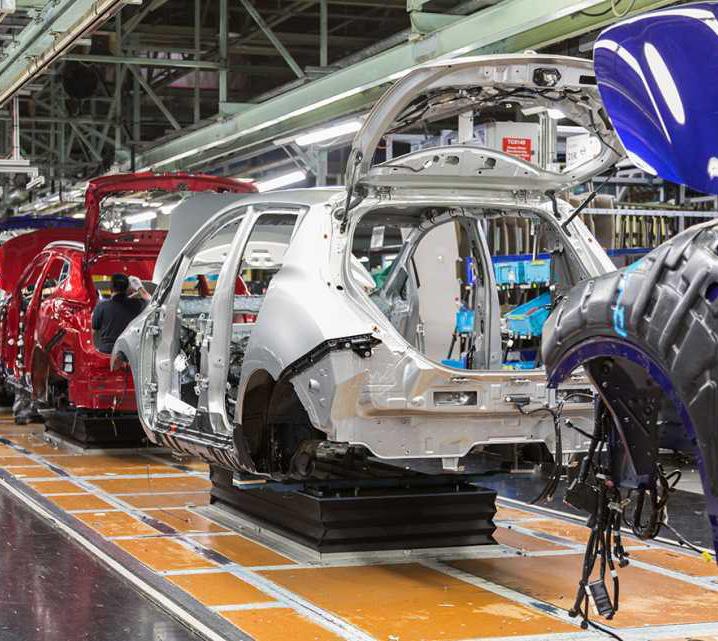
3 minute read
SMMT warns of fierce global competition for EV production
from GreenFleet 145
by PSI Media
Zemo Partnership’s Andy Eastlake
The Society of Motor Manufacturers and Traders (SMMT) has published ‘Race to Zero: Powering Up Britain’s EV Supply Chain’, a strategy for electric vehicle production in the UK.

The strategy warns that Britain’s ability to compete as an electric vehicle production leader is at risk unless government responds urgently to increasingly fierce international competition. Other countries have significantly increased political and economic backing for their own automotive sectors, positioning themselves at the front of the queue for investment.

Race to Zero: Powering Up Britain’s EV Supply Chain sets out the UK’s intrinsic strengths in advanced automotive manufacturing, low carbon energy and R&D, but stresses the need for an urgent response to initiatives such as the US $370 billion Inflation Reduction Act and EU Green Deal Industrial Plan.
The blueprint sets out a Green Automotive Transformation strategy that would position Britain as one of the world’s most competitive locations for advanced automotive manufacturing, matching its world-leading market ambition to end the sale of non-zero emission cars and vans in 2035.
The strategy identifies investment, regulation and trade as the key pillars to anchor future vehicle production in Britain. Derisking private capital with more competitive incentives and action on energy costs, with support for the next British innovation in batteries and renewables, will stimulate greater investment in EV enterprises. Reform of regulation will accelerate delivery of new production facilities and renewable energy generation. Maximising trade opportunities, meanwhile, would help secure access to essential raw materials. Such moves will secure the essential gigafactories which can underpin EV production.
Mike Hawes, SMMT Chief Executive, said, “Britain boasts a firm foundation of EV production, backed by low carbon energy, outstanding R&D and a highly skilled and productive workforce. We must not squander these advantages. With other parts of the world turbocharging their support for the zero emission vehicle transition, we need to step up to compete in this global race. Every part of the country has a stake in the switch and with fast, decisive action we can deliver for Britain the growth, jobs and green prosperity this country deserves.”
READ MORE
March’s figures will be an important staging post for electric vehicle sales as suppliers look to assess the impact of the Chancellor’s March Budget and other recent trends. Battery electric car registrations continue to rise in absolute numbers; 12,310 new registrations in February 2023 gives BEVs a market share of 16.5 per cent of all new car registrations (a lower proportion than Feb ’22 but in a much bigger market). However, BEVs’ share of the new car market has been erratic in recent months and quite flat overall for the last six months or so (notwithstanding the now normal December rush to meet CO2 targets), constrained by supply difficulties and, perhaps, latterly also by the rise in electricity prices relative to petrol.
While electricity prices are now falling and are expected to fall further (though probably not to pre-Ukraine War levels), petrol and diesel prices at the pump have been falling faster.
I probably wasn’t the only one to raise an eyebrow at the Chancellor’s decision to freeze fuel duty for the 13th year in a row and I was certainly surprised that the 5p ‘temporary’ discount introduced last autumn was also extended for a further 12 months. The New Economics Foundation has taken a look at the numbers and – aside from the £6bn cost to the Treasury of the continued duty freeze – says that the effect on fuel demand of lower petrol and diesel prices will lead to 3.4-3.9m additional tonnes of CO2 being released; the equivalent of adding 2-2.3m more cars to UK roads for a year.
There was also nothing in the Budget to address the discrepancy over VAT between public and home charging despite quite vocal calls before the budget for this to be amended.
While BEV car sales have been sluggish, vans fared even worse in a similarly growing overall market with sales dropping 18 per cent to represent only five per cent of the new van market YTD.
In both sectors, March and the new plate is a critical month with sales typically double regular volumes.
Despite these short-term factors, there are plenty of reasons to keep the faith. Gas and electricity prices are falling and discussions are also under way to decouple the electricity price from gas, which has kept the electricity price artificially high.
Manufacturers have geared up and are producing new models (such as Ford’s new Explorer EV) and variants with eyes clearly on volume production and the mass market. There’s a battery electric car available now (though not quite yet a van) to suit most users’ needs, desires and, even, pockets, particularly if a total cost of ownership approach is taken.
This trend will only accelerate now as the 2030/5 ending of sale of ICE vehicles hoves into view and the details of the Government’s Zero Emission Vehicle Mandate (due to take effect from 2024) is announced (possibly even by the time this article is published).
So, while from a fleet and user’s perspective the economics of running an EV compared with an ICE vehicle has taken a bit of a hit in recent months, from here on the trends are all heading towards cost savings, greater vehicle choice and – crucially – lower and even zero, emissions.
Further Information
www.zemo.org.uk










